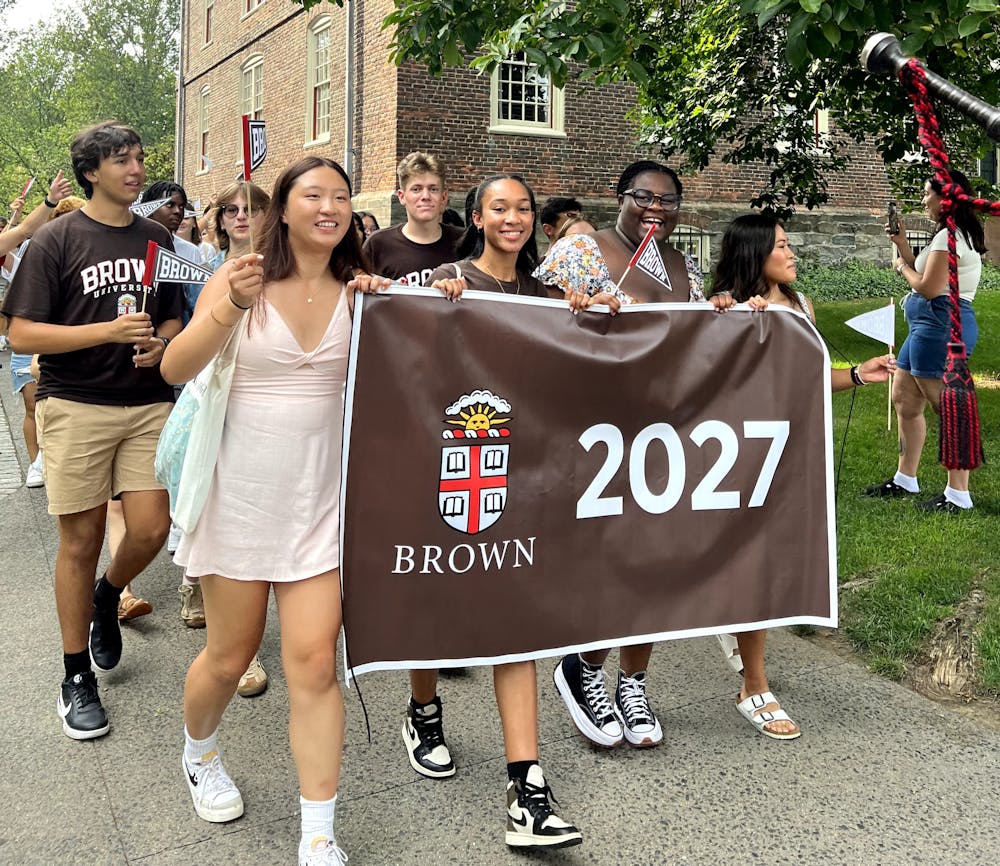Incoming undergraduate, graduate and medical students walked through the Van Wickle Gates for the first time Tuesday afternoon to kick off the University’s 260th Opening Convocation.
On the Main Green, President Christina Paxson P’19 P’MD’20 welcomed the thousands of students — 1,699 members of the class of 2027, around 1,235 doctoral and master’s students, 144 medical students, 10 resumed undergraduate education students and 77 transfer students, according to a Sept. 1 press release — who will begin their academic journeys at Brown this fall.
This year’s convocation, a celebration of the start of a new academic year, featured speeches from Paxson and keynote speaker Kim Cobb, the director of the Institute at Brown for Environment and Society.
Paxson began her speech by enumerating three principles central to Brown’s community: the pursuit of education, the importance of financial accessibility and the value of diversity in education. Paxson noted that since her first convocation speech in 2012, these ideals and other aspects of higher education have come under much more legal and political scrutiny, citing the recent Supreme Court decision prohibiting the consideration of race or ethnicity in college admissions.
Despite these new political challenges, Paxson emphasized the need for students with a wide variety of backgrounds, experiences and cultures within the Brown community. She explained that the University will continue to employ a variety of lawful strategies to maintain diversity among the student body. Speaking directly to the incoming classes, Paxson said that she is still “incredibly optimistic about Brown’s future and our ability to draw on our differences to advance knowledge and understanding for the benefit of society.”
Paxson then introduced Cobb, whose keynote speech, titled “Your Climate Inheritance,” highlighted the opportunities incoming students have to address the climate crisis inherited from previous generations.
According to Cobb, part of the “climate inheritance” is the growing threat of global warming, with 2023 expected to become the hottest year on record. “Despite over thirty years of scientific clarity about the drivers and paces and consequences of human-caused climate change, we are woefully ill prepared for our climate present, let alone our climate future,” Cobb said.
In her speech, Cobb also discussed other, more uplifting aspects of incoming students’ climate inheritance, for example the success research has had in expanding public knowledge of environmental concerns.
Current generations now have access to an extensive global network of climate scientists, political figures and concerned citizens with the potential to “stop global warming by mid-century and potentially initiate global cooling by the time your children are entering college,” Cobb said.
But the most important part of students’ inheritance, according to Cobb, is the Brown community that has “continually redefined climate, environmental, sustainability and social justice leadership in higher education.” With the University’s new sustainability plan, individuals from across the Brown community are now actively working and collaborating to establish clear climate solutions, she said.
Cobb encouraged the students in attendance to combine their interests, however broad, to further the global climate movement. “We have the opportunity to shape the arc of human history on this planet,” Cobb said. “Let us work together to ensure that our climate inheritance for the next generation is as large and enduring as it could possibly be.”
Some students in attendance said they appreciated the significance and mindfulness with which diversity in higher education and climate change were discussed in Tuesday’s speeches. “Brown is known for wanting to change the world, and that was evident in the speeches today,” Caroline O’Brien ’27 said.
O’Brien added that the messages of Paxson and Cobb’s speeches emphasize that the University is not just an academic institution — it is also a community that strives to make the world a better place.
Adrien Durantel ’27 praised Cobb for encouraging all community members, regardless of career or concentration, to participate in climate justice. “Everyone has a part to play, no matter what you want to do,” Durantel said.
Julianna Chang is the managing editor of production and development of The Herald's 135th Editorial Board. She previously served as a university news editor overseeing the academics & advising and student government beats. A junior from the Bay Area, Julianna is studying Biology and Political Science on the pre-medical track. When she's not in class or in the office, she can be found eating some type of noodle soup and devouring bad books.





